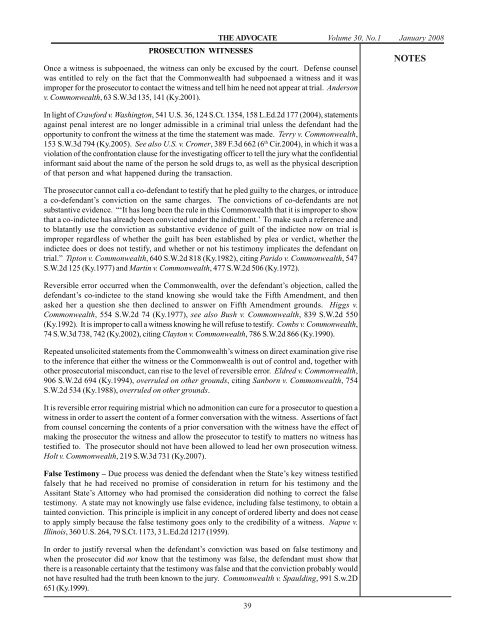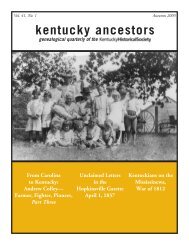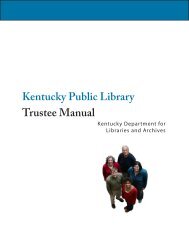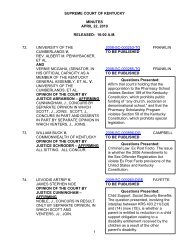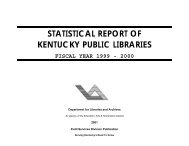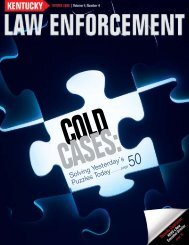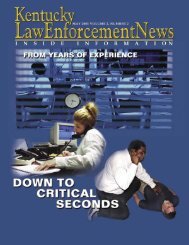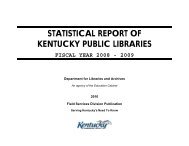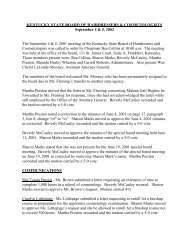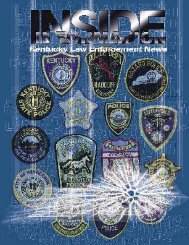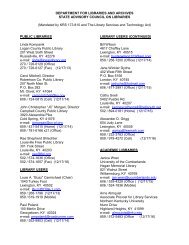Jan08 Advo.pmd - e-archives Home
Jan08 Advo.pmd - e-archives Home
Jan08 Advo.pmd - e-archives Home
You also want an ePaper? Increase the reach of your titles
YUMPU automatically turns print PDFs into web optimized ePapers that Google loves.
PROSECUTION WITNESSES<br />
THE ADVOCATE Volume 30, No.1 January 2008<br />
Once a witness is subpoenaed, the witness can only be excused by the court. Defense counsel<br />
was entitled to rely on the fact that the Commonwealth had subpoenaed a witness and it was<br />
improper for the prosecutor to contact the witness and tell him he need not appear at trial. Anderson<br />
v. Commonwealth, 63 S.W.3d 135, 141 (Ky.2001).<br />
In light of Crawford v. Washington, 541 U.S. 36, 124 S.Ct. 1354, 158 L.Ed.2d 177 (2004), statements<br />
against penal interest are no longer admissible in a criminal trial unless the defendant had the<br />
opportunity to confront the witness at the time the statement was made. Terry v. Commonwealth,<br />
153 S.W.3d 794 (Ky.2005). See also U.S. v. Cromer, 389 F.3d 662 (6 th Cir.2004), in which it was a<br />
violation of the confrontation clause for the investigating officer to tell the jury what the confidential<br />
informant said about the name of the person he sold drugs to, as well as the physical description<br />
of that person and what happened during the transaction.<br />
The prosecutor cannot call a co-defendant to testify that he pled guilty to the charges, or introduce<br />
a co-defendant’s conviction on the same charges. The convictions of co-defendants are not<br />
substantive evidence. “‘It has long been the rule in this Commonwealth that it is improper to show<br />
that a co-indictee has already been convicted under the indictment.’ To make such a reference and<br />
to blatantly use the conviction as substantive evidence of guilt of the indictee now on trial is<br />
improper regardless of whether the guilt has been established by plea or verdict, whether the<br />
indictee does or does not testify, and whether or not his testimony implicates the defendant on<br />
trial.” Tipton v. Commonwealth, 640 S.W.2d 818 (Ky.1982), citing Parido v. Commonwealth, 547<br />
S.W.2d 125 (Ky.1977) and Martin v. Commonwealth, 477 S.W.2d 506 (Ky.1972).<br />
Reversible error occurred when the Commonwealth, over the defendant’s objection, called the<br />
defendant’s co-indictee to the stand knowing she would take the Fifth Amendment, and then<br />
asked her a question she then declined to answer on Fifth Amendment grounds. Higgs v.<br />
Commonwealth, 554 S.W.2d 74 (Ky.1977), see also Bush v. Commonwealth, 839 S.W.2d 550<br />
(Ky.1992). It is improper to call a witness knowing he will refuse to testify. Combs v. Commonwealth,<br />
74 S.W.3d 738, 742 (Ky.2002), citing Clayton v. Commonwealth, 786 S.W.2d 866 (Ky.1990).<br />
Repeated unsolicited statements from the Commonwealth’s witness on direct examination give rise<br />
to the inference that either the witness or the Commonwealth is out of control and, together with<br />
other prosecutorial misconduct, can rise to the level of reversible error. Eldred v. Commonwealth,<br />
906 S.W.2d 694 (Ky.1994), overruled on other grounds, citing Sanborn v. Commonwealth, 754<br />
S.W.2d 534 (Ky.1988), overruled on other grounds.<br />
It is reversible error requiring mistrial which no admonition can cure for a prosecutor to question a<br />
witness in order to assert the content of a former conversation with the witness. Assertions of fact<br />
from counsel concerning the contents of a prior conversation with the witness have the effect of<br />
making the prosecutor the witness and allow the prosecutor to testify to matters no witness has<br />
testified to. The prosecutor should not have been allowed to lead her own prosecution witness.<br />
Holt v. Commonwealth, 219 S.W.3d 731 (Ky.2007).<br />
False Testimony – Due process was denied the defendant when the State’s key witness testified<br />
falsely that he had received no promise of consideration in return for his testimony and the<br />
Assitant State’s Attorney who had promised the consideration did nothing to correct the false<br />
testimony. A state may not knowingly use false evidence, including false testimony, to obtain a<br />
tainted conviction. This principle is implicit in any concept of ordered liberty and does not cease<br />
to apply simply because the false testimony goes only to the credibility of a witness. Napue v.<br />
Illinois, 360 U.S. 264, 79 S.Ct. 1173, 3 L.Ed.2d 1217 (1959).<br />
In order to justify reversal when the defendant’s conviction was based on false testimony and<br />
when the prosecutor did not know that the testimony was false, the defendant must show that<br />
there is a reasonable certainty that the testimony was false and that the conviction probably would<br />
not have resulted had the truth been known to the jury. Commonwealth v. Spaulding, 991 S.w.2D<br />
651 (Ky.1999).<br />
39<br />
NOTES


